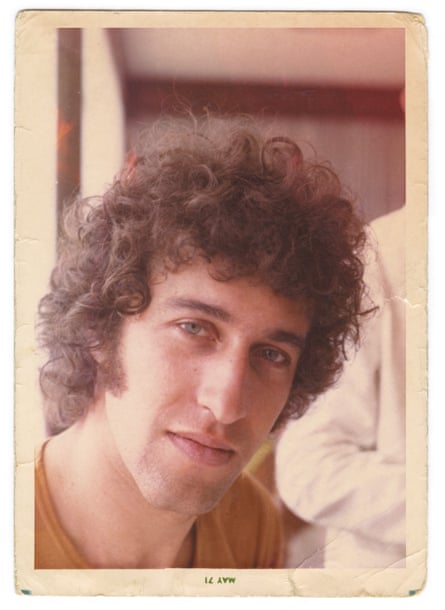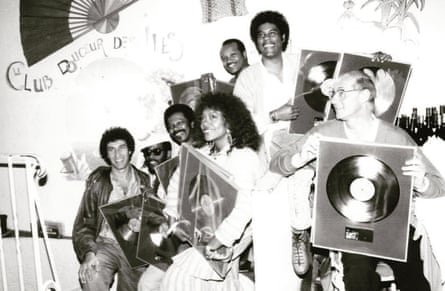Almost the very first thing Daniel Vangarde says when he walks into the Paris workplace of his file label is that he’s by no means accomplished an interview in English earlier than. Then once more, he provides, he had by no means accomplished an interview in his native French both till this morning. He by no means bothered speaking to journalists on the peak of his profession, when he was a key determine in French pop: an artist, author and producer behind an array of releases that vary from the wildly obscure to the immediately acquainted. And he definitely wasn’t anticipating to begin assembly the press aged 75: Vangarde had retired years in the past, relocating to a distant fishing village in northern Brazil.
However then a file firm unexpectedly approached him a few career-spanning compilation, named after Zagora, the label he based in 1974, which piqued his curiosity. After they despatched him the monitor itemizing, he informed them that a few of the songs on it weren’t his. They have been – he’d simply forgotten them completely.

A minimum of a part of the renewed curiosity in Vangarde’s profession is right down to the success of his son, Thomas Bangalter, till lately one half of Daft Punk. It’s ironic on condition that listening to Daft Punk was one of many causes Vangarde gave up making music within the first place: “I believed, that is the brand new era coming and will probably be troublesome to compete.”
However Vangarde’s profession is fascinating in its personal proper. It started with a bullish teenage plan to interrupt into the music business by merely writing to the Beatles and suggesting they let him be a part of – “I used to be positive I might convey one thing to them,” he chuckles – and ended within the early 90s with Vangarde retiring in disgust after a sequence of bitter arguments with the French music business.
In between, he pursued a profession which was nothing if not numerous. At one excessive, he wrote protest songs deemed so subversive they have been banned: his eponymous 1975 solo album got here to business grief on account of its lead single, Un Bombardier Avec Ses Bombes, an assault on France’s position within the worldwide arms commerce. “The large honour I had was that I did one tv look after which it was censored in France. Even at the moment, you can not discuss that topic.”
On the different, he was the mastermind behind the Bouzouki Disco Band, whose oeuvre was noticeably missing in assaults on the military-industrial advanced: as their identify suggests, they dealt completely in Hellenic-themed disco tracks with names like Ouzo et Retsina and Greek Ladies. His CV additionally takes in big worldwide pop successes – Vangarde and his long-term collaborator Jean Kluger have been behind late-70s hitmakers the Gibson Brothers and Ottawan, of D.I.S.C.O. and Arms Up (Give Me Your Coronary heart) infamy – in addition to incredible cosmic disco launched beneath the names Starbow and Who’s Who, and obscure Japanese-themed funk rock idea albums beloved of at the moment’s crate-diggers.
The contents of 1971’s Le Monde Fabuleux des Yamasuki, have, as Vangarde places it, “turn out to be a bit of bit modern” lately: the album has been sampled by Erykah Badu, included on an Arctic Monkeys-curated combine album and featured on the soundtrack of the TV sequence Fargo. It was remarkably forward of its time: a mad, cartoonish mix of various musical cultures that additionally tried to impress what would now be referred to as a “dance problem” (the album’s cowl comes full with directions on learn how to do the steps).
Vangarde was all the time interested by music exterior the usual western pop canon. “I prefer to journey, I like unique devices, I hear a bit of to the Beatles, the Seaside Boys, Stevie Surprise, however many of the music I like is African music, Arabic music, reggae,” he says. However Le Monde Fabuleux des Yamasuki’s inspiration didn’t contain a lot unique journey. “ the TV sequence Kung Fu, with David Carradine? That was the factor on the time. We thought we should always do an album about kung fu, and that turned a Japanese factor.”
He labored throughout quite a lot of genres – he reworked a monitor from the Yamasuki album in Swahili as Aie A Mwana, subsequently lined by, of all individuals, Bananarama – however it was disco that actually turned his head, his thoughts blown after listening to Stylish’s Le Freak in a Parisian membership. Furthermore, it was a style that didn’t share the period’s historically dismissive Anglo-American angle to French pop. Vangarde thrived, as did his countrymen House and Voyage. “There have been no prejudices in disco, I believe as a result of its viewers had skilled prejudice – it was Black, it was homosexual. They weren’t within the place of being snobs.”
The truth is, he liked disco a lot that when the backlash occurred, he felt impelled to behave within the style’s defence: to listen to him inform it, Ottawan’s deathless wedding ceremony occasion anthem D.I.S.C.O. is successfully a protest music. “It was the time after they have been burning the disco records within the US, and I felt loopy that folks stated it will cease: it’s a rhythm, you possibly can’t cease individuals dancing to a rhythm. So I stated we’ll do a music about disco to indicate that’s not over. And the rhythm didn’t cease,” he provides, triumphantly. “As a result of what’s techno? A continuation of disco.”

For all his pop success and tolerance for a tacky novelty music, Vangarde was all the time a curiously unbiddable determine, wont to show down high-profile manufacturing jobs if he favored the artist an excessive amount of, as within the case of reggae stars Third World or salsa supergroup the Fania All-Stars. “I didn’t need to be concerned. I simply wished to be a listener – I didn’t need to lose that magic.”
Simply how unbiddable turned obvious within the late 80s, when he received embroiled in a battle with the French music business, initially about royalties. Researching the topic led him to take up the reason for Jewish composers who had had their mental property rights – and the accompanying earnings – stripped from them throughout the Nazi occupation of France. This turned an issue that finally concerned then-president Jacques Chirac, however Vangarde says a subsequent official report into the matter was “all lies – an enormous cover-up”: no cash or rights have been returned. It was one other consider his resolution to retire. “I had an enormous battle with Sacem, the authors’ rights firm. To put in writing a music and provides it to this firm – why would I do that?” He shrugs. “I don’t do this any extra.”

It’s pretty straightforward to see the place Daft Punk may need received their famously uncompromising angle in the direction of the music business. When their profession started to take off, it was Vangarde who recommended they make an inventory of the whole lot that they didn’t need to do and current it to any labels trying to signal them, which is how he ended up with a credit score “for his valuable recommendation” on their debut album, Homework.
“They didn’t need the label to be concerned with the imaginative and prescient of the music, or the movies, or their picture. This is among the keys of their success, as a result of if you go within the system, it has to please the A&R [people], it has to please the radio, and the music adjustments. Daft Punk have been unique, they’d expertise, and what they imagined went to the ear of the individuals with no interference.”
Vangarde says he has no need to return “within the system” himself. He says he by no means listens to the music he made within the 70s and 80s – “I wrote 350 songs, and I couldn’t sing you one in every of them” – and appears aghast on the suggestion that this new retrospective compilation may entice him again into the studio. “No, I’m very glad now. They wished to launch an album, I made a decision to do interviews for the primary time in my life. And now,” he smiles, drawing our dialog to a detailed, “I’ll give up once more.”




